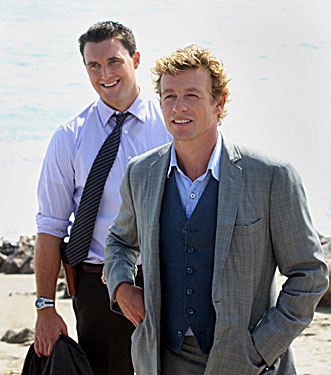Dear Television Writers and Producers:
Let me start off by saying that I am a huge fan of television and that I particularly enjoy the pervasive one-hour episodic drama genre. Cop and lawyer shows are my absolute favorite, despite the fact that they often present embellishments and minor procedural inaccuracies. One of the only things that a legal education is guaranteed to do is suck all of the enjoyment out of watching courtroom shows that play it fast and loose with the formalities of litigation, but I’ve learned to ignore most of the discomfort that comes from watching a make-believe prosecutor present character evidence in his case-in-chief. I hardly cringe anymore when I hear scripted dialog about “robbing” a house or “murdering” an animal. I am writing today, however, to tell you of a related faux pas that I haven’t been able to ignore.

“Are you saying that our show is unoriginal?”
As I’m sure you are aware, a subclass of the traditional police show has been popping up with greater frequency in recent years. The basic premise for these shows is this: A civilian “consultant” is brought in by a law enforcement agency, based on some enhanced knowledge or skill possessed by said civilian, thereby magically improving the agency’s crime solving abilities. Amongst this subclass, I am a religious viewer of Psych, The Mentalist, Castle, White Collar, Fringe, and Bones (I can’t stand this one, to be honest, but it’s my wife’s favorite), to name a few. With varying degrees of success, each of these programs attempts to present a compelling dynamic between straight-laced cops and one or more outside-the-box thinkers, who presumably aren’t bound by the paradigm that you’re typical “G-man” occupies. It’s a classic odd couple arrangement – rambunctious corner cutter plays off of an endearing straight man. My issue lies with one particular outside-the-box solution that is floated again and again on these shows.
Invariably, twenty-five minutes or so into an episode, after the murder victim’s body has been found, after the initial “gimme” suspect has been cleared of guilt, the investigation hits a snag, wherein the good guys’ quest for truth is thwarted. They could bust the whole case wide open, if only it weren’t for that new suspect’s pesky constitutional rights.
Ah! – but now the *civilian* consultant has an idea. He or she will swoop in and do that which the government can’t… because he or she isn’t a cop. They can enter that guy’s house without a warrant (violating his Fourth Amendment rights). They can continue to question that suspect, after she has asserted her right to remain silent (violating her Fifth Amendment rights). Sure, you can beat a confession out of that stubborn criminal (Fifth again). His lawyer isn’t there after formal charges have been filed? No problem; just have the consultant talk to him (Sixth Amendment violation). Through it all, our hero boldly proclaims with an “aw shucks” grin, “I’m not employed by law enforcement, so I don’t have to worry about all of that nonsense.” Are you KIDDING ME?!?!? Who is it in TV land that thinks that is true?

“It’s okay; I’ll just let Blondie ask the questions.”
As far as I’m aware, the current state of the law indicates that civilians who are acting on behalf of law enforcement, whether formally employed by the government or not, are bound by the same standards as law enforcement officials. This means that when Patrick Jane coerces a confession out of a suspect, it’s no less of a constitutional violation than if Agent Rigsby did it.
I can hear your response clear as day: “So, what’s the big deal? It’s fiction, right?” True. But criminal procedure is a rapidly changing and delicate area of the law – one that’s based in large part on perception. Courts of Appeal and the United States Supreme Court make decisions all the time that affect how the Bill of Rights governs the conduct of law enforcement officials. There is a nearly constant ebb and flow of restriction and permission, based on judicial precedent, that dictates what conduct is kosher and which investigative procedures violate the Constitution. As an example, almost no one in the general public fifty years ago had any idea that they had the right to remain silent when the cops questioned them. Now, in large part thanks to television, nearly every American can recite verbatim the warnings that the U.S. Supreme Court ordered police officers to give in its Miranda v. Arizona opinion.
The more distressing scenario involves the circumstances under which the police need to obtain a warrant before searching. The current jurisprudence dictates that a police officer is only “searching” an area, within the meaning of the Fourth Amendment (meaning they need a warrant, in the absence of extenuating circumstances), if you have an expectation of privacy in that area. Guess who gets to decide whether you have an expectation of privacy in a particular area or thing. At the end of the day, its a majority of the unelected Justices who sit on the United States Supreme Court – i.e., five out of nine people who you didn’t vote for and can’t vote out if you don’t like their conclusions. How do they decide whether you have an expectation of privacy? Your guess is as good as mine, but the written opinions seem to indicate that its based on what they think the public opinion is. If the prevailing conventional wisdom is that there’s no expectation of privacy in a some situation, presto chango, there isn’t one.

“I’m changing the scope of the Fourth Amendment, using only the power of my mind.”
I know it may seem like a stretch that television would dictate what the Constitution means, but it also doesn’t look like these types of shows are going away any time soon either. Thanks to the popularity of CSI: Crime Scene Investigation, everyone now believes that i) there’s blood and/or semen on every single surface you see; ii) it takes a couple of hours to analyze said DNA and determine whodunit; and iii) if the DA doesn’t present that evidence in court, he must be hiding something or the police screwed up. Ironically, the cure IMHO is the same as the disease: Hire a legal consultant to give input on issues of criminal procedure. It doesn’t have to be a fancy, expensive one. A first-year associate, fresh off of studying for the Bar Exam is likely just as good – and I have it on good authority that there are plenty of those out there looking for a job. Now get back to work, and develop that next pilot, with Adam Sandler on a desert island, falling in love with a coconut.
|
Sincerely, |















[...] article was originally posted on GaneshaFish.com The content of this article is intended to provide a general guide to the subject matter. [...]
Jason – You just might be beating a horse that’s been dead for years. I’ve fought this battle for a long time with very little success. I even titled the last chapter in my book (Police Procedure and Investigation, A Guide For Writers) CSI Don’t Think So. I also write a daily blog called The Graveyard Shift that’s dedicated to setting the facts straight regarding police procedure, forensics, and CSI. And, I write a weekly review of shows like Castle where I point out the flaws in police procedure and forensics. I do the reviews in a tongue-in-cheek style, and it’s a lot of fun, but I write it with a specific purpose – to help writers know the differences between reality and fiction.
Also, I host an event called Writers’ Police Academy. The WPA is a hands-on event for writers and anyone else who’s interested in learning about police work and investigation. The WPA is held at a real police academy and the workshops are all taught by actual police academy instructors and other police experts from across the country.
So you see, I do all this and I still see TV cops racking rounds into their 9mm’s. And I still read about smelling cordite in books written by bestselling authors.
But, I haven’t given up hope that someday TV writers, showrunners, and authors will learn that fiction should be believable, yes, but not absurd
Mr. Lofland — What good is a dead horse if you can’t beat on it every now and again?
In all seriousness, though, thanks for your comment. I realize that an emphasis on verisimilitude is almost never the first priority for movies and television. It wouldn’t be much fun to watch if all they showed was real life. That said, I appreciate your previous efforts and consider you a brother-in-arms in the fight against grossly inaccurate entertainment outlets. If nothing else, you’ve gained a new reader for your blog from this exchange!